I'm trying to add a custom XML to an open Excel 2007 workbook using C#. I'm using Microsoft.Office.Interop.Excel as an interface. I've discovered there's a CustomXMLPart class but I can't figure out how to use it. Initially I expected the code to be something simple like:
CustomXMLPart myXMLPart = new CustomXMLPart(xmlString);
myWorkBook.XMLCustomParts.Add(myXMLPart);
but that isn't close to working.
I've tried finding examples online but they are bafflingly complex talking about Packages, Addins, OpenXML, VSTO streams etc. I've unzipped a suitable workbook (xlsx) and found it has docProps/custom.xml element.
I just want to add a similar custom.xml to a new workbook (2007) before saving it. Is this possible? Please note I can't install any additional packages or libraries.
Edit: I've made a tiny bit more progress investigating this issue. I am confident I have the correct Office reference (Microsoft Office 12.0 Object Library under COM) and Excel interop reference (Microsoft.Office.Interop.Excel under GAC).
The declaration
Microsoft.Office.Core.CustomXMLParts myCustomXMLParts;
compiles, however
Microsoft.Office.Core.CustomXMLParts myCustomXMLParts =
Microsoft.Office.Interop.Excel.Workbook.CustomXMLParts;
results in the error message: Error CS0029: Cannot implicitly convert type 'Microsoft.Office.Core.CustomXMLParts' to 'Microsoft.Office.Core.CustomXMLParts.
When I hover over the Excel CustomXMLParts property it claims to return a CustomXMLParts object which is in some sense, a Microsoft.Office.Core.CustomXMLParts object but not quite the same as in the Office assembly. So there's clearly some incompatability here but I can't resolve it. I have Microsoft Office Professional Plus 2007 (12.0.6612.1000) and Office 2007 Primary Interop Assemblies (12.0.4518.1014) installed.
Edit: I am fairly certain that it's the Office DLL that's the problem. On Add-Reference I see "Microsoft Office 12.0 Object Library" and can add it without any error. It appears as simply "Office" under References. However it seems to be invisible to the compiler while still claims Microsoft.Office.Core is defined in an assembly that is not referenced and specifies assembly 'office', Version=12.0.0.0.
My Office reference is linked to MSO.DLL under Microsoft Shared/OFFICE12 and has Major Version 2 Minor Version 4 under Properties. Does this matter? Or is the error message just indicating it isn't processing this referenced for some reason?
Edit: Adding the COM object "Microsoft Office 12.0 Object Library" definitely seems to be the problem. From other forum posts I've discovered that other people see a reference of "Microsoft.Office.Core" appear but I only see "Office". I've tried editing the .csproj file directly and that does give a "Microsoft.Office.Core" but it still doesn't work. The only conclusion I can really make is that my MSO.DLL for Office 12 Professional Plus (version (12.0.6612.1000) doesn't actually contain Microsoft.Office.Core assemblies, or at any rate doesn't expose them properly.
